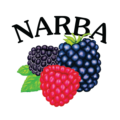📢 New Publication Alert: Blackberry Pruning: A Practical Guide
NC State Extension has released a new resource for blackberry growers—A Brief Blackberry Pruning Guide by Gina Fernandez and Hannah Lepsch. This publication provides step-by-step recommendations on how to properly prune blackberry plants to improve yield, fruit quality, and plant health. Topics include cane removal, tipping techniques, trellis management, and disease prevention.
Whether you are a commercial producer or a home gardener, this guide offers practical, research-based strategies to keep blackberry plantings productive year after year.
👉 Read the full guide here: Blackberry Pruning: A Practical Guide
About the Authors: Dr. Gina Fernandez is Professor of Horticultural Science and Small Fruit Extension Specialist at NC State University. Hannah Lepsch is a Research Technician supporting caneberry research and Extension programs at NC State.


.jpg)




